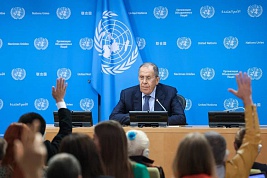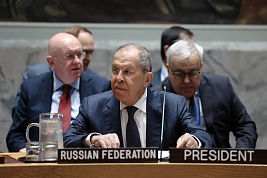Speech by the Russian Foreign Minister Sergey Lavrov and his answers to questions from the mass media at the joint press conference summarising the results of his negotiations with the President of the Republic of Slovenia, Borut Pahor, and the Slovenian Foreign Minister, Karl Erjavec, Maribor, 8 July 2014
Ladies and Gentlemen,
This morning we held an emotional and touching opening ceremony of the museum of memories of Soviet warriors, who were plagued to death in the Nazi concentration camp in Maribor. Many thanks and hats off to all those Slovenians and Russians, who created this museum and implemented the project, which is another symbol of our spiritual closeness, historical truth and partnership.
Today at the meeting with the President, Borut Pahor, and the Minister of Foreign Affairs, Karl Erjavec, we discussed all areas of our bilateral partnership. We expressed satisfaction at the conduct of our political dialogue at summit and high levels, the development of our trade, investment interaction, the implementation of humanitarian projects, including our cooperation with the Forum of Slavic cultures, which is functioning at the initiative of Slovenia.
We appreciate the traditionally constructive position of Slovenia in what concerns the relations between Russia and the European Union, and within the NATO-Russia Council. The position of Ljubljana is targeted at interaction on any complicated issues, without disagreements being caused as a pretext for freezing our relations. This relates to the situation which is being created in Europe and in relations between Russia and the EU with regard to the Ukrainian crisis. At the request of the President of Slovenia, Borut Pahor, we stated our detailed assessments of the genesis of the (Ukrainian) crisis and its current state. We explained why Russia is absolutely convinced that we need to put everything aside for the sake of an immediate and unconditional stop to the use of force.
We are convinced that Slovenia is one of those countries of the European Union, which hear us, understand our position and the priority of a cease fire.
Like yesterday in Bulgaria, today we devoted a lot of attention to our energy interaction – the important South Stream project was mentioned. We are convinced that we need to remove all the artificial obstacles on the path of its implementation and act according to the concluded intergovernmental agreements. We expect that the European Commission will renew suspended activities of the work group, which was created for the consideration of the issues of implementation of the South Stream.
We exchanged opinions on the situation in Syria, Iraq, in the Middle East and North Africa in general. We and our Slavic friends are worried about it. We share the understanding that we need to underline the main thing for the settlement of crises – the fight against terrorism.
To end, I will note that we coordinated reciprocal steps, to properly celebrate a range of events devoted to 100 years since the beginning of the First World War and 70 years since Victory in the Second World War, which we are already starting to celebrate this year and will continue in 2015.
We know that elections are expected to take place in Slovenia. These are not the first elections in the period of our warm relations. I am convinced that as in the previous election periods, succession will be ensured. We are convinced of this and we feel that the overwhelming majority of the Slovenian people are interested in this.
Question: The Slovenian Foreign Minister, Karl Erjavec, said that during his visit to Moscow he was assured that the agreements between Russia and Austria do not threaten the construction of the Slovenian section of the South Stream. Could you please repeat these statements openly for the Slovenian public? Where do you see obstacles for the implementation of this project at European level, on the Slovenian and the Russian side?
Sergey Lavrov: As to the first part of your question, frankly speaking, it sounds strange to me that you doubt the words of your Minister in his presence.
We are interested that all those who signed up to participate in the South Stream, through the mechanism of intergovernmental agreements, continue to do so.
As to artificial barriers on the path of the implementation of this project, we are convinced that any attempts to use the Third Energy Package retrospectively are contrary to the norms of international law and practices, which have always existed in relations between civilised states. We emphasised many times that we fully recognise the right of any of our partners, including, of course, the European Union, to take decisions on further ways of conducting our affairs in our or another area. In this regard, we recognise the presence of the Third Energy Package, but it is simply unfair to apply its requirements to the agreements which were concluded in previous years. Besides that, as I have already said, this is contrary to all the norms of international conduct.
We expect to renew our dialogue, which started between the Russian Federation and the European Commission with the support of South Stream member states and was aimed at the settlement of the existing situation. Currently, this dialogue is suspended at the initiative of the EU Energy Commissioner, Gьnther Oettinger. I repeat, we are for the stopping of this pause and the renewal of our dialogue.
Question (addressed to Karl Erjavec): Can you confirm the information provided by Slovenian mass media that the US diplomats working in Slovenia attempted to prevent the current visit of Sergey Lavrov? Do the European Commission and the United States put strong pressure on Slovenia on the issue of the South Stream?
Sergey Lavrov (adds to the answer of Karl Erjavec): Frankly speaking, I did not know about the story with the US embassy. But this is interesting. Thank you to John Kerry. By the way, there have been many ambassadors at the opening ceremony of the Museum of memories of Soviet prisoners of the Nazi concentration camp today, however, there were no ambassadors from western countries. I hope that this is not related to their attitude to this event.
Question: What is your attitude to the fact that in the period, when Russia together with several countries and leaders of the European Union is attempting to settle the Ukrainian crisis, the EU Council will probably adopt new measures against Russia, in particular, with regard to the extension of the "black list" of Russian nationals?
Sergey Lavrov: Frankly speaking, I stopped following the agreements, which are adopted in the European Union, which deadlines are set for the new examination of another "black", "grey" or other list. We are not interested in this, we need to stop the bloodshed as soon as possible.
Thanks to the correspondents working at the risk of their lives in the South-East of Ukraine, we all see what is happening there, and how much the solemn words by the Ukrainian President, Petro Poroshenko, that the Ukrainian army has a categorical order not to shoot at cities, villages, residential neighbourhoods and not to bomb civilians, reflect reality. These, as he emphasised in one of his speeches, are the "knightly" traditions of the "Ukrainian warriors".
However, other things are happening there. We see dead people, crippled bodies, destroyed houses and apartments. Human fates are being destroyed, flows of refugees are escaping from fire – this is terrible. Against this backdrop the words by the Ukrainian leaders that a truce is possible only if the militia accept the "peace plan of Petro Poroshenko" (i.e. capitulate and will expect to receive amnesty), are puzzling and kill any opportunities of achieving a truce. I hope that our European colleagues will be primarily concerned about this.
The four-party Statement by the Russian, French, German and Ukrainian Foreign Ministers, which was mentioned by my Slovenian colleague, contains a clear appeal for an immediate and unconditional bilateral cease fire. There are no conditions like capitulation of the militia or anything like that. Unconditional cease fire is what Ukraine, jointly with us, the Germans and the French, signed under.
We all know that not only Europe, but also the United States are also showing special interest in the situation in Ukraine. We would like to believe that they are also interested in a faster cease fire. However, I read a message yesterday that the US President, Barack Obama, had a phone conversation with the President of France, Francois Hollande. In the information as a result of this conversation the Elysee Palace emphasised the task of a faster cease fire, while the White House preferred to place an emphasis on the confirmation of the right of the Ukrainian leaders to suppress separatism in the South-East. This is all the difference.
I hope that at further ministerial and other sessions of the European Union, including summits, Europe will insistently appeal to what we agreed on in Berlin on the 2 July. I am probably risking bringing sanctions upon myself, but what to do – the truth is worth this!


